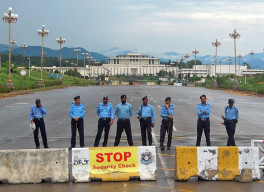
NATO warplanes, acting under a United Nations mandate to protect civilians, had stopped government troops advancing on rebel strongholds but the collapse of Gaddafi's rule, which many Western governments seek, had not materialized.
After a fresh series of air strikes on his Bab al-Aziziya compound in Tripoli, Gaddafi taunted the Western military alliance, saying in an audio recording aired on Friday that he was in a place where NATO could not reach him.
General David Richards, Britain's chief of defence staff, said the military campaign to date had been a "significant success" for NATO, but it needed to do more. "If we do not up the ante now there is a risk that the conflict could result in Gaddafi clinging to power," he was quoted in the Sunday Telegraph newspaper as saying.
"At present, NATO is not attacking infrastructure targets in Libya. But if we want to increase the pressure on Gaddafi's regime then we need to give serious consideration to increasing the range of targets we can hit," he told the paper.
Nearly three months after a revolt began against Gaddafi's four-decade rule, fighting between rebels and government forces on several fronts has come to a near-standstill and Gaddafi is refusing to bow to efforts to force him from power.
Libya’s foreign minister, Abdelati Obeidi, sounded a defiant note when he met in Tripoli with Abdelilah al-Khatib, the United Nations special envoy to Libya. "The Libyan people will not kneel and will not give in," the state-run Jana news agency quoted.
The uncertain direction of the Libya conflict creates a dilemma for Western governments. An inconclusive outcome is likely to limit Libyan oil exports, keeping world prices high, and driving thousands more migrants to make the hazardous journey across the Mediterranean to Europe.
Earlier on Saturday, Libya held a funeral for nine imams, killed in a NATO air strike on the eastern city of Brega a day earlier. The alliance said the building it struck in Brega was a command-and-control-centre.
Rift amongst security forces, officers defecting
Earlier Tunisia's state news agency reported that a boat arrived at the south-eastern port of Zarzis carrying three officers who had defected from Gaddafi's security forces, joining several other Libyan officers who had arrived in Tunisia by boat in the past few days. Security officials in North Africa and elsewhere said one of the risks from a lingering conflict in Libya is that Al Qaeda's north African branch could exploit the chaos to acquire weapons and recruit followers.
A Tunisian security official told Reuters on Sunday that two suspected al Qaeda members had been arrested near the border with Libya carrying an explosives belt and several bombs.
Misrata skirmishes
In Misrata over the past few days the rebels had pushed government troops out of most parts of the city and captured the airport, but its sea port, the only supply route, are still within range of pro-Gaddafi artillery. "The (pro-Gaddafi) brigades still have military equipment enabling them to bombard any area in Misrata. You can expect anything from them because they behave like criminal gangs," a rebel spokesman called Abdelsalam said from the city.
Pro-Gaddafi forces have bombarded the city for weeks, killing hundreds, although the rebels have held out with help from NATO air strikes. "There are skirmishes every now and then mainly in the eastern area of Kararim. The brigades opt for tactical retreats before launching attacks, using missiles and mortars," he said.
"The revolutionaries are in full control of the port but the danger is still there because the brigades have tanks and rocket-launchers."
Thousands of people have been killed in the conflict in Libya, the bloodiest of the revolts which have convulsed the Middle East in what has been described as the "Arab spring".



1731975305-0/Untitled-design-(40)1731975305-0-165x106.webp)
1731975060-0/Untitled-design-(39)1731975060-0-165x106.webp)





1731929357-0/Express-Tribune-(6)1731929357-0-270x192.webp)






COMMENTS
Comments are moderated and generally will be posted if they are on-topic and not abusive.
For more information, please see our Comments FAQ